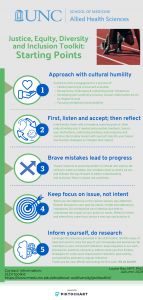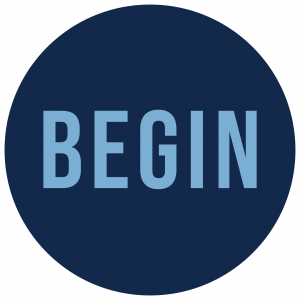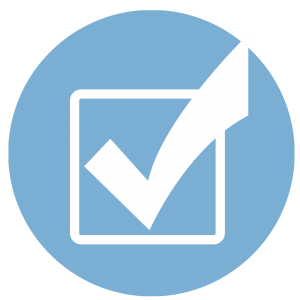Initial Steps
- Approach with cultural humility

Commit to active engagement in a process of:- Lifelong learning and critical self-evolution
- Recognizing, challenging & redressing power imbalances
- Developing and sustaining inclusive, mutual relationships driven by respect and trust
- Pursuing institutional accountability
- First, listen and accept; then reflect
Intentionally listen with a receptive, learning posture. Seek understanding, and if needed and possible, feedback. Search your motivations, underlying premises, base response and narrative. Be brutally honest with yourself. Identify you biases, and develop strategies to mitigate their impact. - Brave mistakes lead to progress
Thwart instincts to avoid discomfort or retreat into silence. Be willing to make a mistake. Our mistakes show us where we are and indicate the way forward to better understanding and inclusion. When in doubt, ask questions. - Keep focus on issue, not intent
When you feel defensive or the need to explain, pay attention! Remain focused on your goal for equity, insight and addressing imbalances. Do not describe your intention, but seek to understand the impact of your action or words. Reflect on them and where they came from, devise a new way and practice it. - Inform yourself, do research
Leverage the resources provided in the JEDI Toolkit. Identify areas of need and work to close the gap of your knowledge and awareness. Be relentless in your critical self-reflection. Seek equities in our work, procedures, practices and policy; address what you find. Employ strategies for continuous improvement: intention, goal setting, accountability partner(s), regular reflection.
Thank you for your efforts and energy in this work. We will all benefit.
- Be intentionally humble about culture/difference (not demonstrating competence)

- Be corrected without defense
- Listen and accept first
- Do not allow yourself to rationalize, explain or excuse
- Ask questions vs. making statements/clarifying
- Be brave, marinate in being uncomfortable
- See something, say something
- Take these free tests of implicit bias (suggest: race, disability, age, sexuality)
- Follow these structured, daily practices to increase knowledge, reflection, insight
- Review this collection of many helpful resources
- Check out our collection of books, films and/or resources
Self-talk: Set or reset yourself
- I can be uncomfortable to make all students/colleagues/people we serve and EVERYONE comfortable.
- I want to be inclusive and have much to learn.
- Correction and error will help me get to my goal of inclusivity.
- This is not about me and my intent.
- Am I in a learning posture? Or defending something (what?)?
The JEDI Toolkit is a resource created by faculty members in the Health Sciences Department to provide guidance and recommendations to health care providers and educators who would like to learn more about equity and inclusion.
